There are so many types of flour. Bleached and unbleached; white flour, whole wheat flour, cake flour; grain free-flours, nut flours, bean flours. So many choices and within each type of flour, there are different brands.
Does the brand of flour matter?
I’m not comparing flour types because you can’t compare cake flour with garbanzo bean flour; one will yield a great angel food cake and the other will yield great socca.
For the sake of this comparison, I’m talking about all-purpose flour and the brand.
A bit about all-purpose flour:
“All-purpose flour has a 10-12% protein content and is made from a blend of hard and soft wheat flours. It can be bleached or unbleached which are interchangeable. However, Southern brands of bleached all-purpose flour have a lower protein content (8%) as they are made from a soft winter wheat. All-purpose flour can vary in its protein content not only by brand but also regionally. The same brand can have different protein contents depending on what area of the country in the United States you are buying it. Good for making cakes, cookies, breads, and pastries.”
“A high percentage of protein means a harder (stronger) flour best suited to chewy, crusty breads and other yeast-risen products. Less protein means a softer flour, best for tender and chemically leavened baked goods, like pie crusts, cakes, cookies, and biscuits.”
Let’s compare based on price:
Store Brand (Ralph’s) Enriched All-Purpose Flour (bleached) = $1.99 for 5 pounds (and it’s almost always “on sale”)
This is what I typically buy and use.
Gold Medal Enriched All-Purpose Flour (unbleached). On sale for $3.49 for 5 pounds, normally $3.99 for 5 pounds
Finally, King Arthur All-Purpose Flour (unbleached). $5.49 for 5 pounds
Many say that King Arthur is the best. It’s nearly 3 times the price. I could buy 15 pounds of the Ralph’s store-brand flour for just 50 cents more than 5 pounds of King Arthur.
It’s interesting that King Arthur has a higher protein content (11.7% vs. 10.5%) compared to the other brands of all-purpose flour. Maybe that’s why people say their baked goods turn out better with The King.
Does the brand of white flour result in a better finished product?
Will my White Chocolate Blondies with Chocolate Peanut Butter Frosting benefit from different flour? I liked them just the way they were. If it ain’t broke, don’t fix it comes to mind.
Will my Fudgy Nutella Brownies somehow improve? I happen to think they’re the moistest, fudgiest, and densest brownies ever and they were made with store-brand flour.
Will my Oatmeal Raisin Cookies improve? These cookies were slightly thinner than I’d hoped, but I don’t necessarily attribute that to the flour. I attribute that to winging it with the recipe and probably needing slightly more flour and slightly less whole oats, more baking soda, and possibly playing around with the egg amount in order to create a slightly thicker cookie; or just chilling the dough.
However, last week a reader wrote to me and said these were the best oatmeal raisin cookies she’s ever made or had.
Would a different brand of flour make my Mango and White Chocolate Chip Cookies thicker? I believe their thinness is attributed more to the fresh fruit that was in the dough than the brand of flour.
It would be interesting to see what happened if I made them with King Arthur flour, but it’s not just the (brand of) flour that changes the texture of cookies. If it was that easy to just buy a certain brand of flour to ensure perfect cookies every time, we all would have done so already and we’d buy that brand forever.
Oven temp and hot or cold patches in the oven
size and shape of raw dough balls
the type of baking sheet
the liner used on the baking sheet such as parchment or a Silpat or nothing
rotating the cookie sheets during baking
the humidity levels and weather outside
baking soda and baking powder and their ratios
the ratios of brown sugar and white sugar
how cold the dough is before baking
the type of mixer used and how much the ingredients were creamed, fluffed, worked or overworked
…all these variables in addition to flour (and brand alone) will impact results.
And that’s just for cookies. There’s bars, brownies, pies, crepes, clafoutis, and croissants. Mind-boggling, actually.
I have a Cookie Baking Chart describing what adding brown/white sugar, melted or softened butter, extra egg yolks, baking soda or baking flour will do to cookies
I used the melted butter and 1 egg + 1 yolk technique in Peanut Butter Oatmeal White Chocolate Cookies. Some of my favorites ever based on both texture and taste, and I used store-brand flour, illustrating that it’s not solely flour that matters.
What kind of flour do you typically bake with? Any types you avoid? Haven’t tried? Want to try?
Do you think brand matters? What brands have you tried and do you have opinions?
But I’d be willing to spring for “vanity” flour like King Arthur rather than store-brand if people think it makes a difference.
And conversations like these are why I’d love to hang out with Alton Brown.
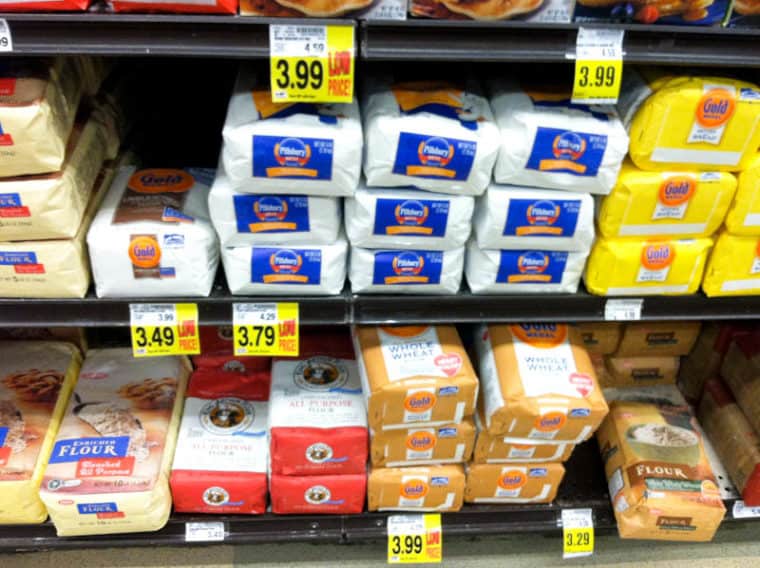
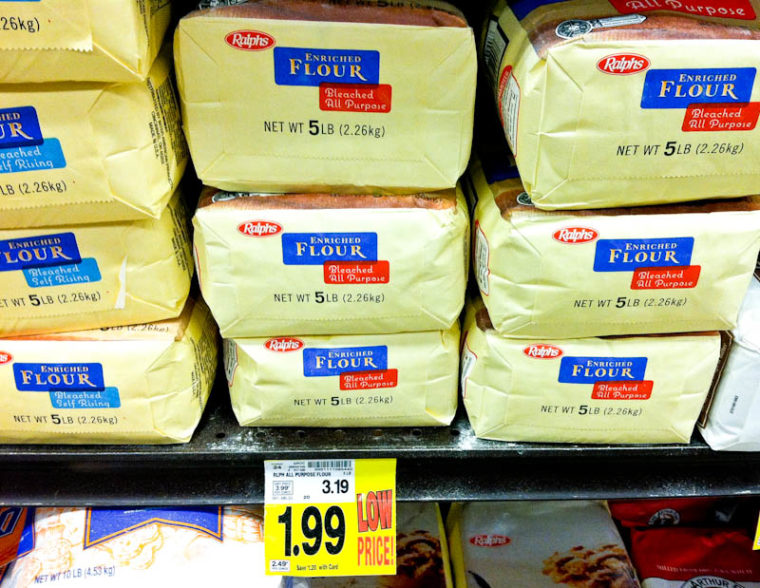
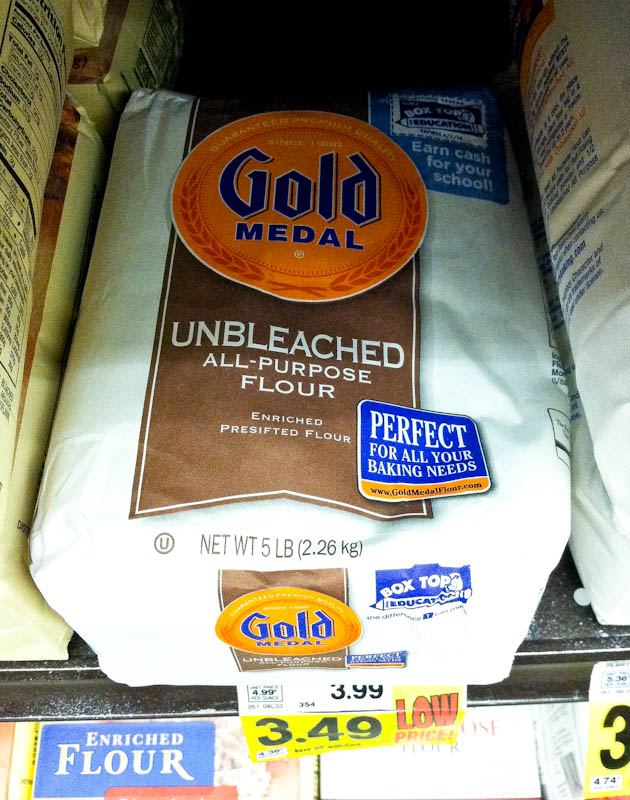
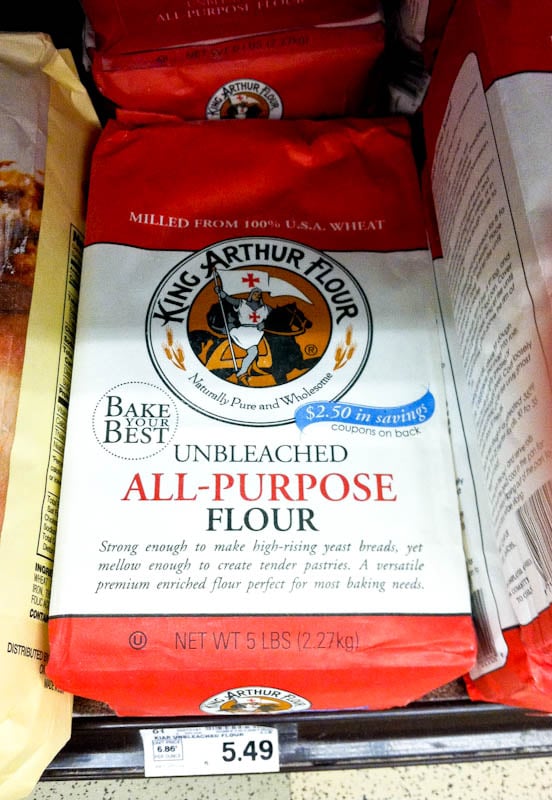
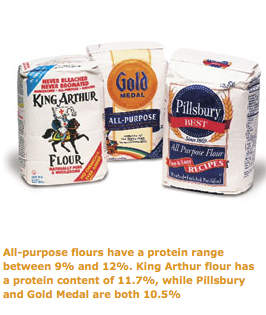
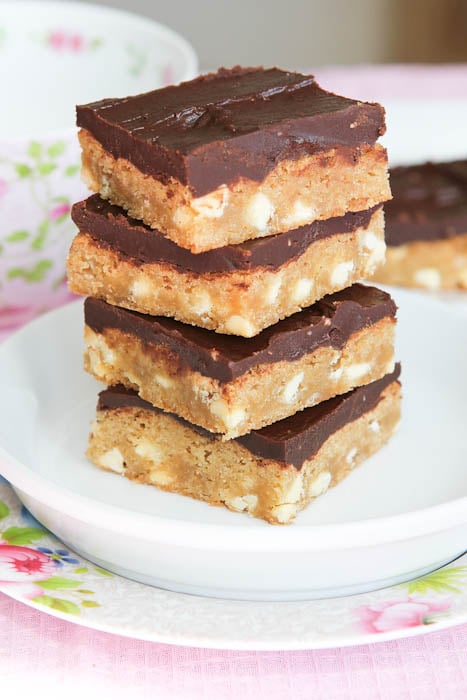
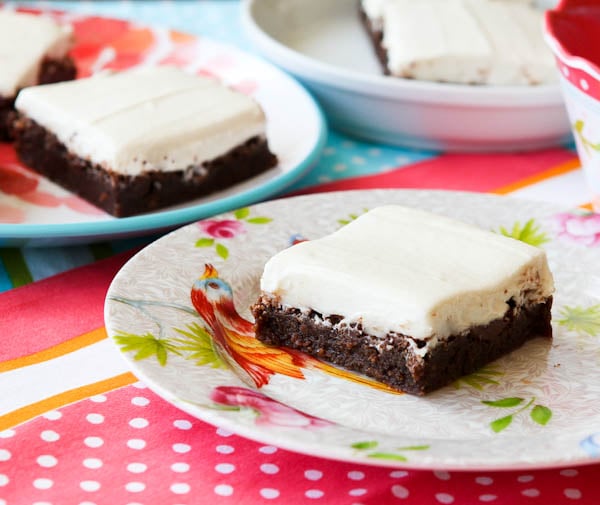
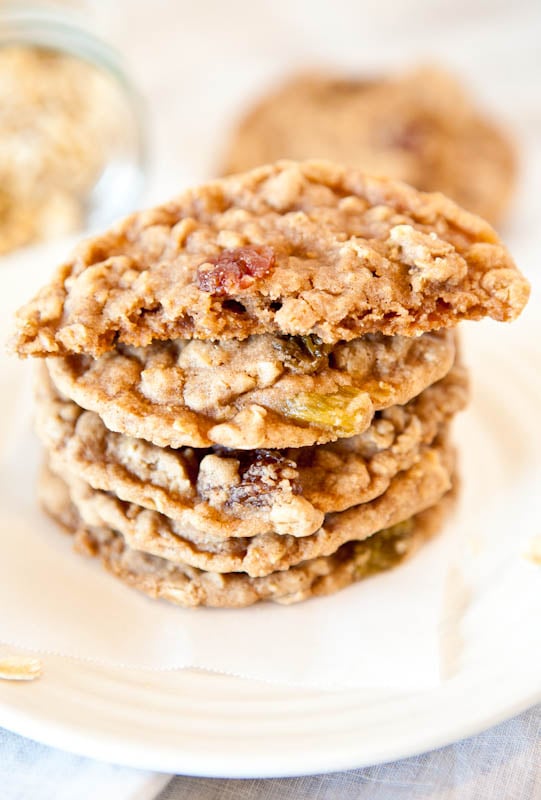
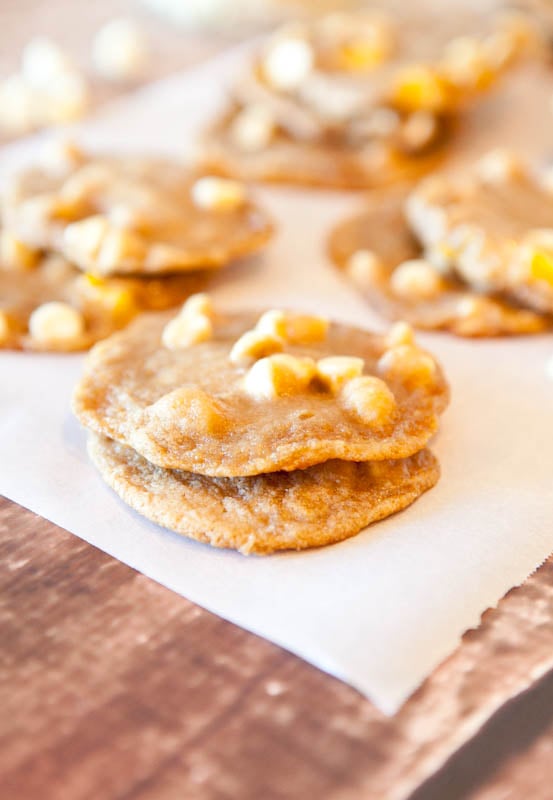
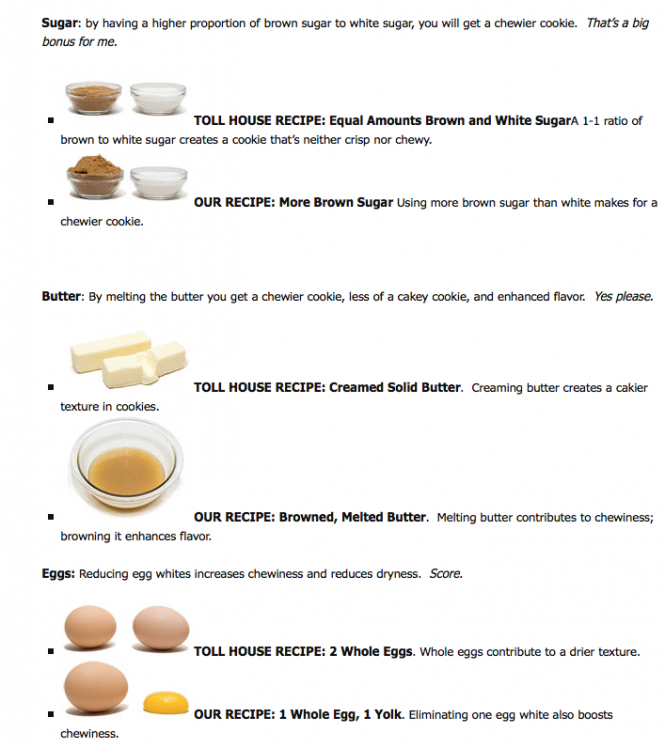
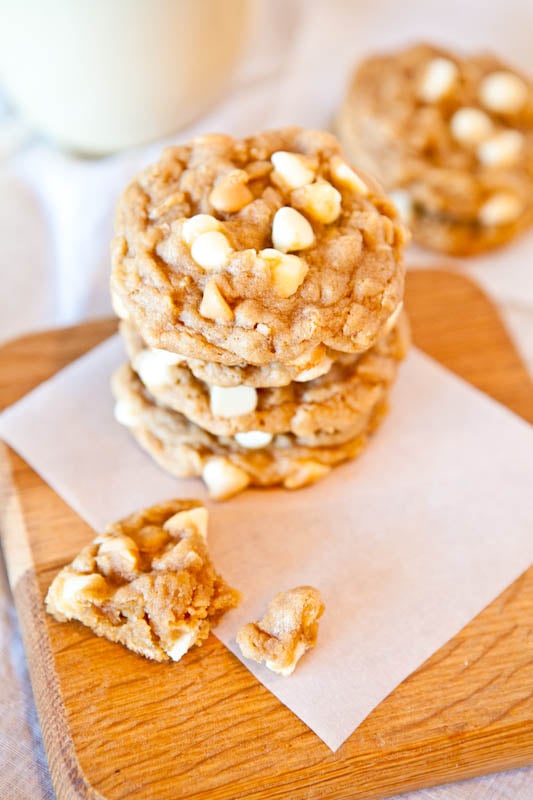
I try to use whole wheat or mix whole wheat and all purpose unbleached. I don’t think brand matters. I’ve tried gluten-free flours as well and oat flour when I can.
P.S. I love my cookies chewier too!
chewy is the only way!
I call b.s. On that small of a protein difference having an effect on baked goods.
Say a 5 lb bag of flour was 11.7% protein. Then there is about 0.58 lbs of protein per 5 lb bag (.117 X 5 = 0.58). Lets say you use 5 lbs of flour to make 20 cookies (theoretically) then each cookie has 0.029 lbs of protein per cookie. There are 16 ounces in a pound, so to break down there is 0.0018 ounces of protein per cookie.
Running the same (theoretical) calculations for the flower that is 10.5% protein, yields
(.105 percentage protein {expresed as a decimal} X 5 lbs of flour = 0.52 lbs of protein per 5 lb bag of flour) = 0.026 lbs of protein per cookie or 0.0013 ounces of protein per cookie.
For some reason I have a hard time believing 0.0005 ounces of protein per cookie make a difference in texture or taste, not to mention the cost.
5 lb bag of flour / 20 cookies = 0.026 pounds of protein per cookie.
Wow you took this to new levels with the math :) Thanks for the breakdown.
That baking chart is really helpful– I love seeing what all of the different methods can do to a simple batch of cookies.
Wow, flour is so much cheeper in the states, like scary cheeper. Here a bag of flour is around 6$ and I buy at the discount store(usually the organic kind).
Organic flour is more expensive here, too. Everything I showed here is conventional.
Bread flour for yeast breads, Kroger AP for everything else. Since I have a vita mix w/ a dry container, I also grind my own wheat berries, buckwheat, millet, quinoa, rice, or any other grain for other flours. I typically mix them with a little AP or bread flour so things will rise better.
I have the dry blade, too. But I actually just grind with the wet blade if I’m just grinding a cup or two of oats :)
Glad to hear you use Kroger AP for everything else.
I have noticed that King Arthur flour gives better results when baking cookies but haven’t really noticed with baked goods. Would be interesting to do a side by side bake test.
“I have noticed that King Arthur flour gives better results when baking cookies”- thanks for that anecdote. I’m going to try it, soon.
Oops. I meant to say better results with bread :)
I pretty much stick to King Arthur for everything: cake flour, unbleached AP, white whole wheat, whole wheat, bread flour. And I agree with a previous poster about the yeast breads – I only use their bread flour if I can help it. The difference is subtle, and part of it is that I really don’t like bleached flour and I can’t find generic unbleached where I live now. It’s not even legal to sell in some countries. Besides which King Arthur is about $3/5lb where I can get it so you betchyer tush I’m buying that! Especially given that I don’t bake like a madwoman a $.50 difference isn’t going to bring down the house. Though if I could find an unbleached generic like I could at HEB in TX I’d be all over that.
50 cents isn’t going to bring down the house….I love that, and so true.
I use a variety of brands depending on the type of flour. For baking I mostly use Bob’s Red Mill whole wheat pastry flour. I agree with other commenters that for bread, King Arthur is the best.
I know you’re frugal and I know you wouldnt say K.A. is the best if you truly didn’t think so….and I take your word for it and am going to try it out!
What a great post! I’ve always wondered what everything actually does in a recipe. I use the King Arthur flour only because it really does make things taste better. I notice it especially when I bake bread.
I take your word for it on the K.A. and am going to try it out!
I only buy generic flour because flour prices are off the charts here. Those $3 bags of flour that you buy costs me about $10. I haven’t tried brand name so I can’t say much!
I do think brand matters. I find that the King Aurthur whole wheat has a better texture than Kroger brand. The one flour I’ve not tried is coconut flour. Not really sure about that one.
I take your word for it on the K.A. and am going to try it out and so many others have said the same thing, too.
Great post, Averie! I typically buy the store brand and buy name brand if they are on sale or if it’s a specific type of flour that I need that might not be available in a store brand. Knowing that AP flours have different percentages of protein is interesting though and I will start to pay attention to it. I think I would spend more on flour if I didn’t go through it so quickly. I would be interested to compare my favorite cookies side by side with different flours to see if I could tell a difference, but then again, I do agree with “don’t fix it if it isn’t broken”!
Glad you enjoyed the post and I know you’re a baker so that’s nice to hear :)
I never knew that having more brown than white sugar makes cookies chewier! Great post, very informative.
Yes which is why if something calls for 1/2 c of white and 1/2 c of brown, I will typically use like 2/3 c brown and 1/3 c white…just to have a higher brown to white ratio.
The protein content can vary by brand even if it is an all purpose flour. I generally don’t notice too much of a difference for day to day things like cookies and pancakes, but my grandma always said it made a huge difference when she made her homemade bread. She always said to avoid Pillsbury for bread baking. Maybe it has a lower protein level.
I do like King arthur a lot. I’m a huge fan of whole wheat pastry flour since it isn’t as grainy as regular whole wheat flour, but it is healthier than AP flour.
Yes in one of those links I cited they mentioned that as well “The protein content can vary by brand” — and I mentioned that “even within the same brand, there is not a Universal standard. ” — which makes a tricky situation even a bit more confusing!
That’s interesting your Grandma said to avoid Pillsbury. That one has one of the lower protein counts, too. Hmmm….
“whole wheat pastry flour since it isn’t as grainy as regular whole wheat flour, but it is healthier than AP flour.” — great tip!
Thanks! & I forgot to mention great post too! I love that you shared about this & highlighted with so many great pics :)
that is something that always confuses me when in the States or in Ireland/UK. In Germany, you pretty much only get either plain flour or whole wheat flour and that is it.
I always use whole wheat flour that I make with my mill and no matter for which purposes, the results are always great!
Oh there are sooooo many varieties. White, wheat, cake, pastry, AP, unbleached, bleached; it’s a bit dizzying and that doesnt even take into account the GF or nut-based flours. I can only imagine it’s a bit baffling to you if you were trying to flour shop here!
Actually in Germany flour is differentiated according to how finely it has been ground (a flour with a lower number has a lower mineral content, has less of the whole grain in it). That is why there is always a number on the package. A white flour that is finely ground (i.e. 405 or 550) would be called cake flour in the States. A white flour for hearty breads would be have a higher number (1050 or 1600). Spelt and Rye have their own ‘degree’ specifications. Whole grains are not typed. When I first moved here I too was very confused and didn’t realize that the numbers on the packages were what differentiated the different kinds of flours. Though it might seem a bit too numbers-oriented, I have come to like this system better. I have made some very fine cakes with less processed flours than the usual ‘cake flour’.
Oh, Ellanie, I did not know that! I mean, of course I know the numbers meant a grade of nutritional content, but I had no clue you could kinda compare it to the US flours.
Though there are still so many more flours, like Averie said.
Thanks for all the info, Ellani!
I used white rice flour for cookies when baking for a friend with gluten intolerance, and they came out really nicely—they were fluffy and moist and really similar in texture to cookies made with all-purpose flour. At home when I’m just cooking for myself, I usually just use whole wheat, but it’s better for some things than others. I’m really curious about chickpea flour, though!
chickpea flour has a very pronounced taste and is heavy/dense…not something I’d want to use in cookies or a cake but I know some people do!